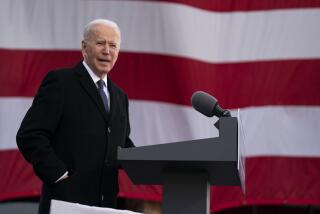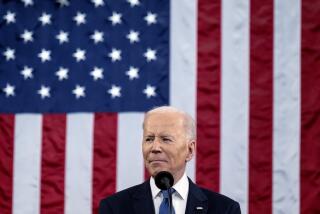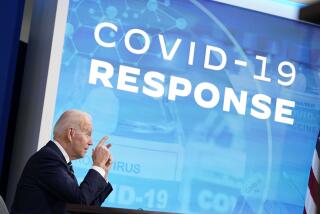Bush Visits Hospital to Prescribe Budget
- Share via
PITTSBURGH — With an inert anthrax spore as a prop, President Bush on Tuesday visited a center that gathers medical data that could signal a biological attack, continuing his effort to sell major elements of his new budget piece by piece.
Bush’s $2.1-trillion budget proposal for fiscal 2003 includes $37.7 billion for homeland defense, up from $19.5 billion this year. Within that is $5.9 billion to defend the nation against a biological attack--a 319% boost in such funding over the current year.
“It’s money that we’ve got to spend,” Bush said. “We must do everything in our power to protect our fellow Americans. We need better testing, better vaccines and better drugs if America is going to be as safe as it can possibly be.”
The budget also seeks $1.6 billion to improve the capacity of state and local health-care offices to respond to biological attacks and would devote $1.8 billion to pay for federal health-care operations after an attack. The White House, in its budget documents, says such an attack would “almost certainly overwhelm existing state, local and privately owned health-care capabilities.”
Bush toured a laboratory at the University of Pittsburgh Medical Center that was established in 1999 to track outbreaks of disease. It now serves as a model for regional centers that would be used to detect a bioterrorism attack.
A similar arrangement has been established in Salt Lake City to help officials be on alert for any signs of a biological attack during the Winter Olympics, which begin Friday, said Gordon Johndroe, deputy press secretary for the White House office of homeland defense.
Bush called the system in place in Pittsburgh “a modern-day DEW line.” That was a reference to the Distant Early Warning system established during the Cold War to warn the United States and Canada if Soviet bombers were approaching from over the North Pole. It was a central element of national defense in the 1950s.
The president also visited a microbiology lab, where a medical technician showed him a harmless anthrax spore that was positioned under a microscope lens and displayed on a television monitor.
The speech in Pittsburgh was one of a series Bush is making to highlight the effect the Sept. 11 terrorist attacks and the spate of anthrax cases in the following weeks have had on his federal spending plan. The spread of anthrax in Florida, the Washington area and metropolitan New York spotlighted weaknesses in preparations to counter an onslaught of biological weapons.
As part of his budget drive, the president visited a Coast Guard unit last week in Maine and addressed the new demands on border security. Also last week, he met with U.S. mayors at the White House to focus on the needs of emergency crews and others responding to disaster. On Monday, the day his budget was sent to Congress, he traveled to an Air Force base in Florida to talk about the military needs that are driving a request to increase Pentagon spending by $48 billion.
Bush’s campaign is directed at building a constituency in a politically divided Congress. The support for national defense priorities appears solid, but Democrats are quickly parting with the president over some of his domestic spending cuts and his insistence that no changes be made to the $1.35-trillion, 10-year program of tax cuts.
The center Bush toured in Pittsburgh collects data on patients’ symptoms and other information from 17 hospitals in the Pittsburgh area to provide warnings of the spread of infectious disease.
Officials say the center’s work illustrates the demands of fighting a bioterrorist attack, as well as the gaps in current capabilities.
“I want to make sure that each region around the country has the proper equipment and the right amount of medicine for victims of any attack, should it occur,” Bush said to an audience of several hundred medical workers.
Under the White House plan, the increase in bioterrorism-related funding would be used to expand state and local health systems, among them the sort of disease surveillance systems the president was visiting.
The money would also pay for increases in the national stockpile of antibiotics and for research to develop vaccines and diagnostic tests, the White House said.
“We’re preparing for the worst,” Bush said.
More to Read
Get the L.A. Times Politics newsletter
Deeply reported insights into legislation, politics and policy from Sacramento, Washington and beyond. In your inbox twice per week.
You may occasionally receive promotional content from the Los Angeles Times.










